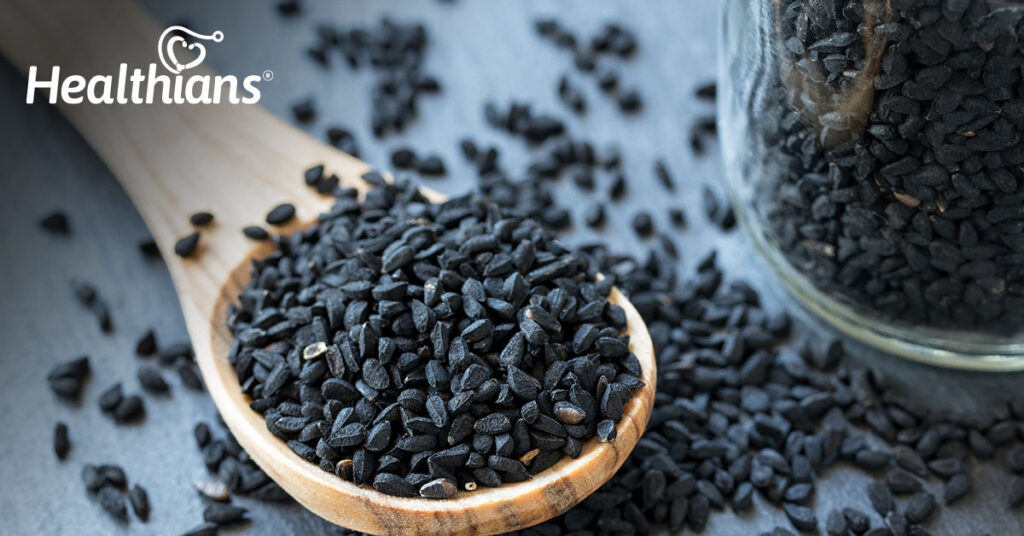Introduction
Black seeds, also known as kalonji, are not wholly unknown to Indians, it is actually quite common to encounter them in Indian kitchens. The seeds, also known as black cumin or Nigella Sativa, have a wide range of culinary applications, like a garnish for flatbreads or as an ingredient for tempering various dals and curries. While you can’t have black seeds in the raw form, they are used to not only enhance the flavour of various dishes but also heal various ailments.
These seeds provide a wide range of health advantages, yet they are generally underappreciated for it. They include a lot of vital vitamins, minerals, fibre, healthy fats, amino acids, and antioxidants, as well as potassium, protein, and fibre.
Black seeds are usually consumed or used either whole or in the form of cold-pressed oil that is produced from the seeds. The use of black seed or black seed oil for controlling blood sugar levels in diabetes is one of the finest applications of black seeds. People with Type-2 diabetes may benefit most from the oil because of all the ways it can help them. Black seeds, also known as kalonji, contain potent antioxidants that benefit the health of Type-2 diabetics in a variety of ways.

Kalonji’s Nutrient Profile
Over 100 nutrients are found in the Black seeds. It comprises roughly of:
- 21% – protein
- 38% – carbohydrate
- 35% – plant fats and oils
- 6% – other nutrients
Benefits of Using Black Seed Oil for Diabetes
Controls the level of cholesterol
Diabetes tends to reduce levels of High-Density Lipoprotein (HDL), a healthy form of cholesterol, while increasing levels of Low-Density Lipoprotein, a harmful form of cholesterol, increasing the risk of heart disease in diabetics. The high content of poly-unsaturated and mono-unsaturated fatty acids in black seeds helps to lower this risk by raising levels of good cholesterol. Studies have shown that adding kalonji to your diet will lower blood LDL and blood triglyceride levels since black seeds have the ability to prevent cholesterol from getting absorbed into the bloodstream.
Controls the levels of blood sugar
Black seeds may help control blood sugar levels, according to some studies. According to research, adding kalonji or black seed oil to the diet of a diabetic may help in controlling maintaining and average blood sugar levels.
Eliminates Inflammation
Increased blood sugar levels, or hyperglycemia, is a primary cause for bodily inflammation. Thus, Type-2 diabetes patients frequently have significant levels of inflammation, which is where black seeds come into play. According to research, kalonji oil or kalonji can help people with Type-2 diabetes avoid future health difficulties or hazards associated with inflammation by reducing their body’s oxidative stress and inflammation-related symptoms.
Keeps blood pressure steady
Black seeds are crucial for regulating blood pressure, potassium, an essential element, is needed by the body. Potassium levels frequently fall in diabetics, causing fluctuations in blood pressure. Due to the high potassium content in black seeds, it can assist diabetic patients to prevent potassium deficit and regulate blood pressure.
Helps with weight loss
Diabetes is a risk factor for obesity. Weight loss is frequently necessary for people with type 2 diabetes since it aids in diabetes control. By reducing hunger and enhancing digestive health, black seed oil can aid in weight reduction. Additionally, it increases metabolism and helps burn calories.
Overall health benefits
Additionally, black seeds contain vital substances that our bodies require in trace amounts to perform fundamental tasks and strengthen immunity. Patients with diabetes, especially those with Type 2 diabetes, can benefit from these substances by including black seeds or black seed oil in their diet. Iron and vitamin C-rich black seed oil also helps to improve the immune system.
Black Seed Oil Side Effects and Allergies
Black seed oil has no negative side effects. However, if used in big doses, it may cause low blood pressure or blood sugar. Mothers who are nursing also should consult with their doctors before starting to consume it.It has also been found in people who regularly consume, during or after surgery, blood clotting may have been slowed down. When applied to the skin, Kalonji can occasionally trigger an allergic response.
However, due to a paucity of clinical evidence, it is challenging to suggest black seed oil as a magic potion for a variety of medical disorders. Therefore it’s necessary to first speak with your doctor if you wish to utilise the benefits of these wonder seeds.
Final thoughts
Kalonji, or black seed oil, is exceptionally high in potassium, a mineral that diabetics are deficient in and that helps blood sugar patients with blood pressure control. It is also extraordinarily abundant in iron and the immunity-booster Vitamin C, both of which are critical for enhancing general health in diabetics. Black seeds may thus be beneficial for Type-2 diabetes patients to include in their regular diet.




